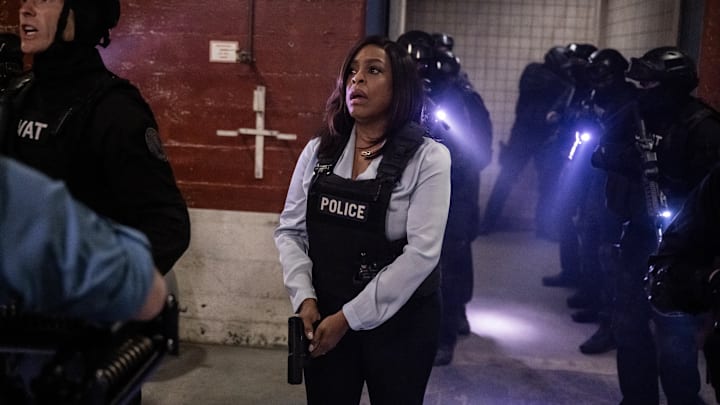Grotesquerie begins with a gripping premise of Detective Lois Tryon witnessing one of the most depraved crime scenes she has ever come across. It sets the scene for what is to come, as Lois must unravel the truth of who this despicable killer is and why they are murdering people in such a way.
At first, Grotesquerie goes about solving these crimes in a fairly unique way, having Lois team up with Megan, a Nun from a local Church with an interest in true crime. It is an unlikely partnership, one that does not make the most sense but is still undeniably interesting. After all, it adds layers to the setting of this particularly dark Church that Grotesquerie wants to craft, headed by Father Charlie Mayhew, who balances his intense religious practice with a physical fitness program led by the Church.
The overall question for most of the season asks what is truly going on and why the killer is leaving their victims in so many positions with religious connections. It would have been a unique take on murder mysteries had Grotesquerie bothered to commit to it. Instead, a little over halfway through the season, Grotesquerie pivots, stepping away from its confusing but unique approach to the story to now try and entangle the audience in a whole new set of plot twists and plot threads.
In a shocking turn of events, the audience discovers that the first six episodes of the series were meant to be a coma dream Lois was having, and everything the viewers had seen, everything Lois had done, was just a warped presentation of her real life.
Following Grotesquerie's late plot twist, Lois was the one in the coma, not her husband Marshall. Lois' daughter Merritt, who Lois envisioned as a woman who lived with her and wanted to go on a reality show, was actually a successful scientist, Megan was actually the Chief of Police rather than a Nun, and Father Charlie was actually a doctor.
Upon Lois waking up, Grotesquerie tries to walk Lois, and the viewers, through the connections by inserting Dr. Witticomb into the story, a man who explains how and why the people in Lois' life were altered to to justify their roles in her dream state. But, by the time Grotesquerie really starts to discuss this, is it too late?
By the time Grotesquerie wants to unravel this plot thread, the audience is already invested in the murders Lois was investigating, and there are only a few episodes remaining to try and explain this new version of the world.
The series does work to want to be a psychological thriller in this respect, wanting to dissect how Lois' trauma from her job resulted in such a horrific coma dream. But, it is the refusal to answer the show's biggest questions that make the conclusion of the season so frustrating.
The season finale, "I Think I'm Dead," is a great example of how pacing did not work in this show's favor in how it devotes its first thirty minutes to Marshall, who is barely important for most of the season's run.
In Lois' dream, Marshall lies in a coma while the truth about his infidelity hangs in the air. In the real world, Marshall's connections to infidelity are still a part of the core of his character, but there is not that much else going on with him, other than his apparent frustration with Lois. Still, this is not a character where it makes sense to dedicate the first thirty minutes to his character and an arc on determining a man's place in the world, which previous to this episode, has never been a part of the core of the series.
Marshall's leading half of the season finale is not organic, as this character has not had enough screen time to lead up to such a massive plot thread in the season finale. Instead, it is an excuse to not have to answer the question surrounding whoever this copycat of the killer in Lois' dreams is.
"I Think I'm Dead" places the main male characters, along with several others, in a room together, in a scene that goes on for far too long, all with characters who have had barely anything to do throughout the season. Had the previous episodes done more to lay the groundwork for this men's club, then maybe there would have felt like there were higher stakes to it. But, instead, the audience is only introduced to it when Marshall is, which is far too late in the season to justify why it is now supposedly important, especially as the other male characters, who are also connected to it, never once showed to have any sort of central tying thread to each other.
While Marshall's leading role in the first half of the finale does not do much for the overall story, it does succeed in taking up time. By the time the episode actually gets back to Lois and the main storyline, Grotesquerie deems it too late to actually reveal the killer and their motivations, leaving it for a potential season two.
Niecy Nash-Betts offers a riveting performance as Lois, which is the highlight of the show. Viewers can be easily captivated by her desperation to solve the case, her anger surrounding the horrors of the killer's actions, and her angst that follows her at work and at home. Otherwise, this is a show that falls short of offering audiences an engaging storyline that they are actually willing to follow through on. In a series with one primary question, it could not be bothered to answer it, which is one of the show's biggest downfalls.
As much as Grotesquerie may thrill with graphic horror, this is not a series that was interested in giving the audience any sense of resolution.
